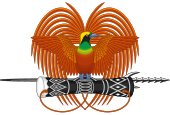| Politics of Papua New Guinea |
|---|
 |
| The Crown |
| Executive |
| Legislature |
| Elections |
| Judiciary |
| Administrative divisions |
|
Foreign relations
|
| Related topics |
|
|
The National Parliament of Papua New Guinea is the unicameral national legislature in Papua New Guinea. It was created in 1964 as the House of Assembly of Papua and New Guinea but gained its current name after the nation was granted independence in 1975.
Composition and electoral system
The 111 members of parliament serve five-year terms, 89 of whom are chosen from single-member "open" electorates, which are sometimes referred to as "seats" but are officially known as constituencies. The remaining 22 are chosen from single-member provincial electorates: the 20 provinces, the autonomous province of Bougainville, and the National Capital District. Each provincial member becomes governor of their province unless they take a ministerial position, in which case the governorship passes to an open member of the province.
From 1964 until 1977 an Optional Preferential Voting System was used. The first past the post system was used from 1977 until 2002. Electoral reforms introduced by former Prime Minister Mekere Morauta introduced Limited Preferential Voting, in which voters numbered three preferred candidates. LPV was first used nationally in the 2007 election.
The prime minister of Papua New Guinea is elected by members of parliament in accordance with section 142 of the national constitution, before being formally appointed by the governor-general of Papua New Guinea. All other government ministers – who form the National Executive Council and act as the country's cabinet – are appointed by the governor-general on the advice of the prime minister. Each government minister must be a member of parliament and section 141 of the constitution provides for the executive to be responsible to the legislature as the representative of the people of Papua New Guinea.
Papua New Guinea has a fractious political culture, and no party in the history of parliament has yet won a majority. Therefore, negotiations between parties have always been necessary to form governments. New governments are protected from votes of no confidence during their first 18 months and during the last 12 months before a national election. More recently, in a move aimed at further minimizing no-confidence motions, then-Prime Minister Mekere Morauta introduced changes that prevented members of the government from voting in favour of such a motion.
All citizens over the age of 18 may vote, although voting is not compulsory.
Latest election
Main article: 2022 Papua New Guinean general electionSee also
- Women in the National Parliament of Papua New Guinea
- Elections in Papua New Guinea
- Speaker of the National Parliament of Papua New Guinea
- Members of the National Parliament of Papua New Guinea, 2002–2007
- Members of the National Parliament of Papua New Guinea, 2007–2012
- Members of the National Parliament of Papua New Guinea, 2012–2017
- Members of the National Parliament of Papua New Guinea, 2017–2022
- Members of the National Parliament of Papua New Guinea, 2022–2027
- List of legislatures by country
- Politics of Papua New Guinea
- Leader of the Opposition
- List of members of the Papua New Guinean Parliament who died in office
References
- "PNC Party's Joseph Lelang is the new opposition leader". One Papua New Guinea. Retrieved 15 August 2022.
- https://devpolicy.org/pngmps/ PNG MP Database
- https://devpolicy.org/pngmps/ 2 from Deceased MPs, Lagaip Open District has no member.
- ^ "About Our Parliament". National Parliament of Papua New Guinea.
- "Papua New Guinea National Elections 2012: Final Report". Commonwealth of Nations. 13 September 2012. Retrieved 19 May 2015.
- "Constitution of Papua New Guinea" (PDF). Parliament of Papua New Guinea. p. 67. Retrieved 30 November 2024.
- "Enrolment Awareness". Electoral Commission of Papua New Guinea.
External links
| Legislatures of Oceania | |
|---|---|
| Sovereign states | |
| Associated states of New Zealand | |


